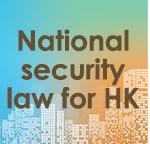HONG KONG - A spokesman for the Hong Kong Special Administrative Region (HKSAR) government has refuted comments made by some foreign ministers on arrests in Hong Kong.
"It is the Hong Kong Special Administrative Region's constitutional responsibilities to safeguard national security,” said the spokesman in a statement issued in response to a joint statement made by the foreign ministers of Australia, Canada and the United Kingdom, and the United States Secretary of State.
Since the enactment of the National Security Law in the HKSAR by the National People's Congress Standing Committee on June 30, 2020 and promulgation for its application in Hong Kong on the same day in accordance with the Basic Law of the Hong Kong, the HKSAR government has been discharging its duty to safeguard national security in Hong Kong lawfully and dutifully, the spokesman said.
The National Security Law, or indeed any law in the HKSAR, applies equally to every person in Hong Kong; no one is above the law, the spokesman added.
READ MORE: China firmly opposes external interference in HKSAR affairs
"We are appalled by remarks made by some overseas government officials that seemed to suggest that people with certain political beliefs should be immune to legal sanctions," the spokesman said.
We are appalled by remarks made by some overseas government officials that seemed to suggest that people with certain political beliefs should be immune to legal sanction.
Spokesman, HKSAR govt
"Hong Kong prides itself on the rule of law; law enforcement agencies are duty-bound to take action against unlawful acts, regardless of the political background of the suspects. Arrests made are based on evidence and strictly in accordance with relevant laws and regulations," the spokesman added.
As provided for in the Basic Law, the Department of Justice of the HKSAR government makes independent prosecutorial decisions based on evidence, applicable laws and in accordance with its Prosecution Code, free from any interference. Any person who is prosecuted has the right to a fair trial by our independent courts, and the burden is on the prosecution to prove that the accused committed a crime beyond reasonable doubt before there can be a conviction, the spokesman said.
Enshrined in the Basic Law – Articles 2, 19 and 85, the courts of the HKSAR enjoy judicial power independently, including that of final adjudication, free from any interference, the spokesman said.
ALSO READ: HKSAR govt says to resolutely safeguard national security
"Whilst it would not be appropriate for us to comment on specific cases into which investigations are still ongoing, we consider it necessary to refute comments made in the joint statement about the National Security Law to set the record straight," the spokesman said.
Safeguarding national security through legislation is in line with international practice. Contrary to allegations that the National Security Law undermines the "one country, two systems" framework, the National Security Law fully and faithfully implements the principles of "one country, two systems" ," Hong Kong people administering Hong Kong" and a high degree of autonomy, the spokesman said.
It clearly stipulates four types of offences endangering national security and the penalties. At the same time, the National Security Law contains specific provisions upholding Hong Kong people's rights and freedoms under the Basic Law as well as the relevant provisions of international covenants on human rights as applied to Hong Kong. The Law also provides for the presumption of innocence, the prohibition of double jeopardy, and the right to defend oneself and other rights in judicial proceedings that a criminal suspect, defendant and other parties in judicial proceedings are entitled to under the law, the spokesman said.
ALSO READ: National Security Law 'crucial' to restoring peace in Hong Kong
"These important features have put the National Security Law on par with, if not superior to, similar national security laws in other jurisdictions. In making those slandering remarks about the National Security Law in their joint statement, senior officials of other jurisdictions are clearly adopting double standards," the spokesman said.
Taking people who have contravened the law to justice is the duty of every government, and where the offence concerns national security, the interests of the country and every citizen are at stake, the spokesman said.
"This national obligation should be fully respected in the international arena."



